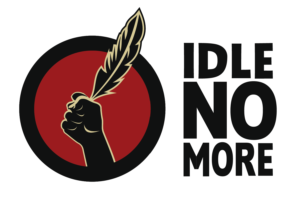Idle No More hasn’t been sitting idle – Idle No More
By Shannon Corregan – Times Colonist
Idle No More is gearing up for an international day of action on Monday. The choice of date is significant, as Monday is the 250th anniversary of the royal proclamation of 1763, which marked the end of the French and Indian War and laid the foundations for British Canada.
Which is when the trouble started.
This summer has been a busy one for Idle No More. In what was dubbed “Sovereignty Summer,” Idle No More arranged a “campaign of co-ordinated non-violent direct actions to promote indigenous rights and environmental protection in alliance with non-indigenous supporters.”
The rallies and events drew attention to six strategic calls for change, including bringing Canada properly into line with the UN’s Declaration on the Rights of Indigenous Peoples and holding a national inquiry into the ongoing disappearance of indigenous women and girls.
The aboriginal rights group first made waves last December when Chief Theresa Spence conducted a hunger strike in an attempt to draw federal attention to the Attawapiskat housing crisis. Since then, it’s grown into a sustained, widespread, tech-savvy movement with long-term objectives and plans — something that wasn’t necessarily a given in December 2012.
Idle No More easily could have splintered and sputtered to a halt after the media boost of Spence’s hunger strike died out, but it hasn’t.
Sovereignty Summer proved that the group has considerable staying power, which is great, because they’ve never ceased to be relevant, even if (or especially because?) the issues they’re fighting for rarely make it into the national headlines.
While Idle No More is hoping to reverse decades of federal neglect and paternalism, the Oct. 7 day of action focuses on particular policy trends of the Harper government, such as the problematic provisions of Bill C-45, and the abandonment of the Kelowna Accord.
The Kelowna Accord, the result of 18 months of collaboration between the Liberal government, first ministers and First Nations leaders, was a comprehensive plan to increase high-school completion rates, improve housing conditions, and reduce youth suicide rates (among the highest in the world).
In fact, let’s not put that in parentheses: Youth suicide rates in Canada’s aboriginal populations are among the highest suicide rates in the world.
Idle No More is also opposing the Harper government’s stance on environmental issues, including the Keystone XL Pipeline.
One can assume that Idle No More is also opposed to Prime Minister Stephen Harper’s determined refusal to engage with them, as though the movement doesn’t exist or doesn’t matter.
Most pertinent, however, is Idle No More’s decision to take the Conservative government to task for its inadequate treatment of missing aboriginal women and girls. In September, the UN Human Rights Council criticized Canada’s rejection of a national inquiry into ending violence against aboriginal women.
Voices in the UN have been pressing Canada to address the problem since 2008, but this issue is clearly not a priority for the Conservatives. In 2010, the federal government massively cut funding for Sisters in Spirit, a national database that tracked missing and murdered aboriginal women.
According to Aborginal Peoples Television Network reporter Jorge Barrera: “Its meticulous research into now nearly 600 cases broke new ground in a realm that had been previously ignored. Its national database became the first of its kind in Canada in its scope and detail.”
Today is the third annual day of action in support of the Native Women’s Association of Canada and the Sisters in Spirit.
Women’s rights have taken the spotlight this year. Reactions to gang rapes in India, sexual violence against female revolutionaries in Egypt, Savita Halappanavar’s death in Ireland after she was denied a life-saving abortion, and the sexual abuse and subsequent suicides of teenaged girls in B.C., Nova Scotia and Montana have all contributed to an international conversation about women’s equality that is finally taking centre stage.
Given this climate of outrage and a commitment to positive change, it’s a shame that native women’s rights are not being afforded the same level of importance in our national consciousness.
British Columbians know better than most what happens when violence against women, especially marginalized women, goes unreported. Robert Pickton was arrested more than a decade ago, but we’ve made no major strides in addressing the conditions that allowed him to commit his crimes.
This is reminder enough that we all need to be invested in the work that Idle No More is doing.
